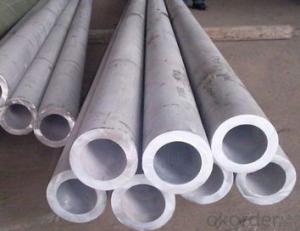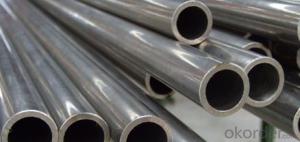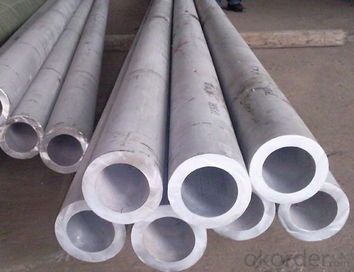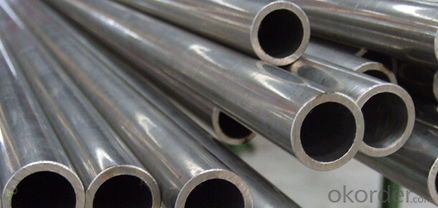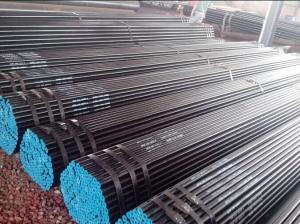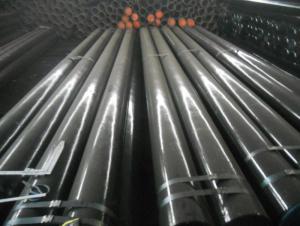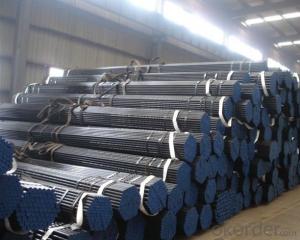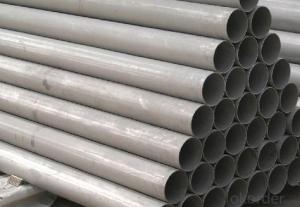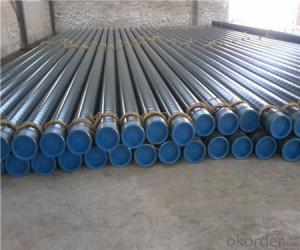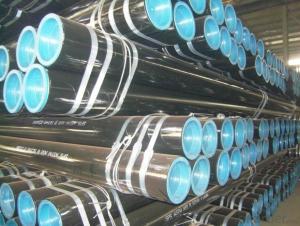ASTM A53 Seamless Carbon Steel Pipe For Sturcture
- Loading Port:
- Tianjin
- Payment Terms:
- TT OR LC
- Min Order Qty:
- 25 m.t.
- Supply Capability:
- 10000 m.t./month
OKorder Service Pledge
OKorder Financial Service
You Might Also Like
Product Description:
1、Structure ofASTM A53 Seamless Carbon Steel Pipe For Sturcture Description:
Seamless pipe is formed by drawing a solid billet over a piercing rod to create the hollow shell. As the manufacturing process does not include any welding, seamless pipes are perceived to be stronger and more reliable. Historically seamless pipe was regarded as withstanding pressure better than other types, and was often more easily available than welded pipe.
2、Main Features of ASTM A53 Seamless Carbon Steel Pipe For Sturcture:
• High manufacturing accuracy
• High strength
• Small inertia resistance
• Strong heat dissipation ability
• Good visual effect
• Reasonable price
3、ASTM A53 Seamless Carbon Steel Pipe For Sturcture Images:
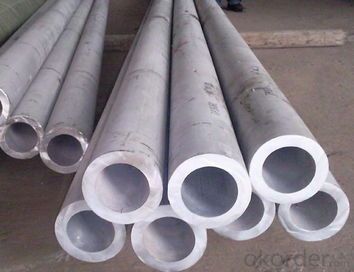
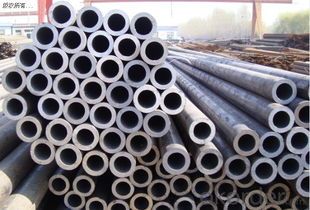
Packaging & Delivery
Packaging Details: | seaworthy package,bundles wrapped with strong steel strip |
Delivery Detail: | 15-30days after received 30%TT |
4、ASTM A53 Seamless Carbon Steel Pipe For Sturcture Specification:
Standard | GB, DIN, ASTM |
Grade | 10#-45#, 16Mn |
Thickness | 8 - 33 mm |
Section Shape | Round |
Outer Diameter | 133 - 219 mm |
Place of Origin | Shandong, China (Mainland) |
Secondary Or Not | Non-secondary |
Application | Hydraulic Pipe |
Technique | Cold Drawn |
Certification | API |
Surface Treatment | factory state or painted black |
Special Pipe | API Pipe |
Alloy Or Not | Non-alloy |
Length | 5-12M |
Outer Diameter | 21.3-610mm |
Grade | 20#, 45#, Q345, API J55, API K55, API L80, API N80, API P110, A53B |
Standard | ASME, ASTM |
1.Material:20#(ASTM A 106/A53 GRB.API5LGRB,GB),45#,16Mn,10#.
2.Specification range:OD:21.3-610mm,WT:6-70mm,length:6-12m or according to the requirement of clients.
3.Excutive standards:GB,ASME API5L.ASTM A 106/A53,Despite of the above standards,we can also supply seamless steel pipe with standard of DIN,JIS,and so on,and also develop new products according to the requirements of our clients!
4.Surface:black lacquered,varnish coating or galvanized.
5.Ends:Beveled or square cut,plastic capped,painted.
6.Packing:bundles wrapped with strong steel strip,seaworthy packing.
5、FAQ of ASTM A53 Seamless Carbon Steel Pipe For Sturcture:
①How is the quality of your products?
Our products are manufactured strictly according to national and internaional standard, and we take a test
on every pipe before delivered out. If you want see our quality certifications and all kinds of testing report, please just ask us for it.
Guaranteed: If products’ quality don’t accord to discription as we give or the promise before you place order, we promise 100% refund.
②How about price?
Yes, we are factory and be able to give you lowest price below market one, and we have a policy that “ for saving time and absolutely honest business attitude, we quote as lowest as possible for any customer, and discount can be given according to quantity”,if you like bargain and factory price is not low enough as you think, just don’t waste your time.Please trust the quotation we would give you, it is professional one.
③Why should you chose us?
Chose happens because of quality, then price, We can give you both.Additionally, we can also offer professional products inquiry, products knowledge train(for agents), smooth goods delivery, exellent customer solution proposals.Our service formula: good quality+good price+good service=customer’s trust
SGS test is available, customer inspection before shipping is welcome, third party inspection is no problem.
Any question, pls feel free to contact us !
- Q: Can steel pipes be used for underground sewer systems?
- Yes, steel pipes can be used for underground sewer systems. Steel pipes are strong, durable, and resistant to corrosion, making them suitable for underground applications. However, factors such as the type of soil, water composition, and potential for ground movement should be considered to ensure proper installation and longevity of the sewer system.
- Q: What is the dimensional stability of steel pipes?
- The dimensional stability of steel pipes refers to their ability to maintain their shape and size under different conditions and over time. Steel pipes are known for their excellent dimensional stability, as they are highly resistant to deformation, warping, and expansion or contraction caused by temperature variations or external forces. This stability is attributed to the inherent strength and rigidity of steel, making it a reliable choice for various applications where maintaining precise dimensions is crucial.
- Q: Are steel pipes suitable for underground drainage systems?
- Yes, steel pipes are suitable for underground drainage systems. They are commonly used in such systems due to their durability, strength, and resistance to corrosion. Steel pipes can effectively handle the pressure and flow of water and other fluids, making them a reliable choice for underground drainage.
- Q: How do you calculate the pipe flow rate for steel pipes?
- In order to calculate the flow rate of steel pipes, one must take into account various factors. Initially, the inside diameter of the pipe, which is commonly represented as D, needs to be determined. Subsequently, the length of the pipe, denoted as L, should be measured. Furthermore, one must be aware of the pressure drop, ΔP, across the pipe and the density of the fluid, ρ. Once all this information is obtained, either the Darcy-Weisbach equation or the Hazen-Williams equation can be utilized to calculate the flow rate. The Darcy-Weisbach equation is typically employed for pipes with turbulent flow, whereas the Hazen-Williams equation is commonly used for pipes with laminar flow. For the Darcy-Weisbach equation, the formula is as follows: Q = (π/4) * D^2 * √(2ΔP/ρ) Here, Q denotes the flow rate in cubic meters per second, D represents the inside diameter of the pipe in meters, ΔP signifies the pressure drop across the pipe in pascals, and ρ stands for the fluid density in kilograms per cubic meter. On the other hand, for the Hazen-Williams equation, the formula is as follows: Q = C * (D^2.63) * (ΔP^0.54) * (L^0.63) In this case, Q represents the flow rate in cubic meters per second, D denotes the inside diameter of the pipe in meters, ΔP signifies the pressure drop across the pipe in pascals, L represents the length of the pipe in meters, and C represents the Hazen-Williams coefficient, which relies on the roughness of the pipe. To ensure an accurate calculation of the pipe flow rate, it is imperative to maintain consistent units of measurement throughout the calculation. Additionally, precise measurements of the inside diameter, length, pressure drop, and fluid density are crucial in obtaining reliable results.
- Q: Can steel pipes be used in marine environments?
- Indeed, the usage of steel pipes is viable in marine environments. Steel, being a robust and sturdy material, possesses the capability to endure the severe conditions prevalent in marine surroundings, encompassing saltwater exposure, wave impacts, and corrosion. Nevertheless, it is imperative to meticulously choose the appropriate steel variant and implement suitable protective measures to avert corrosion. Stainless steel and corrosion-resistant alloys are often employed in marine applications due to their exceptional resistance against corrosion and ability to withstand continuous saltwater exposure. Furthermore, the application of coatings such as epoxy or zinc can be an effective means of fortifying steel pipes against corrosion. Consistent maintenance and inspections are also pivotal in ensuring the durability and functionality of steel pipes in marine settings.
- Q: How are steel pipes used in underground drainage systems?
- Steel pipes are commonly used in underground drainage systems due to their durability and strength. They are typically used to carry and transport wastewater and stormwater away from buildings and structures to a designated disposal area or treatment facility. The corrosion-resistant nature of steel pipes ensures a long lifespan, making them a reliable choice for underground drainage applications. Additionally, steel pipes can withstand high water pressure and are often used in larger diameter pipes to handle a higher volume of water flow.
- Q: How are steel pipes used in plumbing systems?
- Steel pipes are commonly used in plumbing systems for their durability and strength. They are used to transport water, gas, and waste materials in both residential and commercial buildings. Steel pipes are known for their resistance to corrosion and high pressure, making them ideal for underground and outdoor applications. Additionally, steel pipes are often used for plumbing fixtures such as faucets, showers, and toilets, providing a reliable and long-lasting solution for water distribution and drainage.
- Q: Can steel pipes be used for agricultural irrigation?
- Yes, steel pipes can be used for agricultural irrigation. They are durable, resistant to corrosion, and have high tensile strength, making them suitable for transporting water over long distances in agricultural fields. Steel pipes also have the advantage of being able to withstand high pressure, making them ideal for irrigation systems that require efficient water distribution.
- Q: How do steel pipes handle chemical substances?
- Steel pipes are highly resistant to chemical substances due to their durability and corrosion resistance. The smooth interior surface of steel pipes prevents the accumulation of chemical deposits, ensuring minimal reaction with the substances being transported. Additionally, steel pipes can be coated or lined with protective materials to further enhance the resistance against specific chemicals, making them a reliable choice for handling various chemical substances.
Send your message to us
ASTM A53 Seamless Carbon Steel Pipe For Sturcture
- Loading Port:
- Tianjin
- Payment Terms:
- TT OR LC
- Min Order Qty:
- 25 m.t.
- Supply Capability:
- 10000 m.t./month
OKorder Service Pledge
OKorder Financial Service
Similar products
Hot products
Hot Searches
Related keywords
